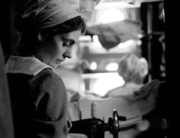Creating a film version of a three-character 19th-century play for modern audiences is a tall order: throw in themes of class consciousness and gender, and the challenges only grow. So it’s clear that director Liv Ullmann had some obstacles ahead of her when she chose to take on the 1888 August Strindberg play of the sexual manipulation and intrigue between a young woman and her father’s valet. While Ullmann pulls out all the stops, Miss Julie is ultimately a failed endeavor.
Played by Jessica Chastain (who’s fairly unavoidable these days), the titular character fairly oozes entitlement. Tonight, on Midsummer’s Eve, with the rest of the family away, she’s in the mood to go slumming with John (Colin Farrell). Though the servant is initially reticent, it’s clear that he harbors feelings of love and lust, and as she tempts him, the two eventually consummate their relationship—an act that threatens both of their worldviews. Representing the voice of sanity (by their 19th-century standards) is Kathleen, John’s demure, salt-of-the-earth fiancée (Samantha Morton).
Ullmann—somewhat inexplicably—moves the locale of the play from Sweden to Ireland. The set and cinematography shine, both the vivid, lush greens of the outdoor shots and the meticulous interiors of the servants’ quarters, where the bulk of the film takes place. This is a gorgeous work, and period drama fans will enjoy soaking in the ambiance.
Unfortunately, Ullmann seems unwilling—perhaps understandably so—to trust her stars with the challenges of conveying the onerous, destructive burden of the 19th-century class system, and so she resorts to visual symbolism that attempts to be artful but ultimately is clunky. John describes to Miss Julie the feeling of seeing her when both were young, of the longing, yearning emotions she inspired in him when he spied on her from afar. Apparently not content with John’s monologues, Ullmann opens the film with a visually stunning but unnecessary scene of Miss Julie as a child, walking the estate grounds and establishing herself as to the manor born.
Similarly, the original play mentions that Miss Julie has an abortofacient cooked up to feed to her dog (the canine coupled with a dog belonging to a servant, and Julie is unwilling to let it give birth to mongrels). However, actually portraying a whimpering pug feeling the drug’s effects is an overstated ploy to emphasize Julie’s cruelty and class consciousness.
Ultimately, though, no matter how beautiful the visuals, the power of this narrative should belong to the lead actors, both of whom fall flat here. It isn’t clear what motivates either—love, lust, or a combination of the two—and it doesn’t seem that Farrell or Chastain know, either. Still waters are meant to run deep, yet both seem paper thin (John is little more than a simple yet yearning romantic, and Miss Julie a petulant, spoiled child), and both struggle under the weight of their long monologues. Neither of them seem truly comfortable with portraying the resentment that their characters feel at the cages in which their society has placed them, Miss Julie due to her gender and John because of social standing. The heavy symbolism (think John literally feeling strangled as he adjusts his cravat) can’t save the film from the actors’ inability to embody these characters.
The film’s sole saving grace is Samantha Morton, who plays her role to perfection. Though she’s offscreen for most of the action, she imbues her character with genuine pathos as well as complexity, portraying a woman grappling with her lover’s infidelity and his willingness to invert society’s strict moral order. While Kathleen is in the victim role, Morton keeps Kathleen free of cliché, absolutely shining in every scene.
Plodding in pace, the film will lose viewers long before its final scenes. The actors attempt to show the devastating effects of their constricting society, yet audiences will likely feel only relief when Miss Julie finally comes to a much anticipated close.

















Leave A Comment